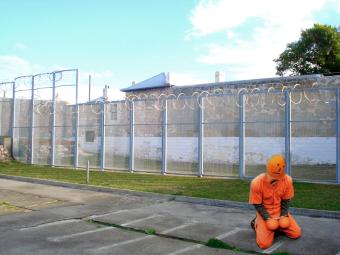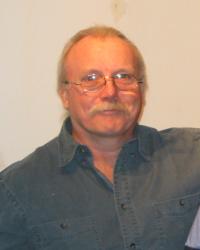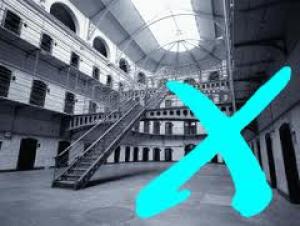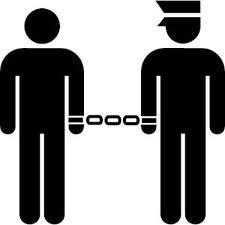Why the current plan to take the right to vote away from prisoners is a terrible idea
by Gordon Campbell

Rick Sauve was a high school dropout. Back in the day, one of his teachers told him he was stupid, that he’d never finish high school and might as well quit – so he took the comments to heart, and left. Eventually, he became a young prospect for the Satan’s Choice biker gang in Port Hope, Ontario. One night in 1978 a drunk and threatening armed member of a rival bike gang got shot in a local bar – and Sauve and five other members of Satan’s Choice in the bar at the time got convicted of murder in a still-controversial trial, and were sent to prison for life.
That’s not what Sauve is known for in Canada, though. In 2002, after 18 years of campaigning (much of it done from behind bars) Sauve won a landmark victory. It took him two separate trips to the Supreme Court to do it, but he and his lawyer Chip O’Connor won the right for prisoners in Canada to vote.
Now 58, Sauve works these days for Lifeline, an innovative programme launched by the Canadian corrections system that enables lifers on parole to go back into prison to offer counseling and parole assistance to prisoners and warders alike. More than anything, Lifeline provides a personal and positive example to inmates currently serving life sentences, that there is hope for a life beyond prison.
Why did winning the right to vote matter so much to him? “Well,” he begins, “when I was sent to prison I was a father, still. I had a daughter. I was married. I had a family. I had always exercised my right to vote. So, even though I was sent to prison it didn’t stop me from having an interest in my community, and in the fact that I had a family in the community. I had a sister who was in the Air Force, so I cared about how our foreign policy affected her. My brothers and sisters with their kids – and with my own daughter going to school – meant that the education system still applied. So, even though I was in prison, it didn’t mean that I wasn’t still a part of my community. “
Obviously though, most bikers who get sent to prison for life on a murder count don’t end up bringing about constitutional change in their country. One key factor that made it possible for him was the passing of the Canadian Charter of Rights in 1982. Unlike our own flimsy Bill of Rights, the Canadian document is embedded, constitutionally – it sets out what are virtually inalienable rights. “ So, when the Charter came in I saw in section three that every citizen had the right to vote. I was still a citizen of Canada, and it was something I’d always exercised in the past. Since I hadn’t been stripped of my citizenship, it was enshrined in the Constitution that it was a right. So that’s when I got a hold of Chip O’Connor, and said I’d like to challenge this.”
The ups and downs of Sauve’s legal battle are still highly relevant to the New Zealand situation. Since 1993, New Zealand has denied the vote to serious offenders serving sentences of three years or more. This year, an idiotic and spiteful private members Bill sponsored by National MP Paul Quinn plans to extend that ban, and to deny the right to vote to every prisoner in a New Zealand jail. (More on that later.)
 Initially, Sauve (pictured left) had lost in the lower court and won on appeal in the Supreme Court. At which point, he says, the Canadian government accepted that it couldn’t deny the vote to all prisoners, so it tried to set an arbitrary moral yardstick akin to New Zealand’s current position – and proposed that serious offenders serving sentences of five years or more would be barred, which would have knocked Sauve out of contention. Sauve went back to court, and won his case. By a narrow majority, the Canadian Supreme Court ruled in effect, that the right to vote is a virtually absolute right that is basic to being a citizen of the country.
Initially, Sauve (pictured left) had lost in the lower court and won on appeal in the Supreme Court. At which point, he says, the Canadian government accepted that it couldn’t deny the vote to all prisoners, so it tried to set an arbitrary moral yardstick akin to New Zealand’s current position – and proposed that serious offenders serving sentences of five years or more would be barred, which would have knocked Sauve out of contention. Sauve went back to court, and won his case. By a narrow majority, the Canadian Supreme Court ruled in effect, that the right to vote is a virtually absolute right that is basic to being a citizen of the country.Since then, the European Court of Human Rights in Strasburg – in a case brought by the British prisoner John Hirst in 2005 – has reached the same conclusion.
Article 25 of the UN Convention on Civil and Political Rights – an international agreement that New Zealand formally recognises – also acknowledges that citizens have the right to vote, without unreasonable restrictions. In Britain, denying prisoners the vote is a relic of the Victorian era, a consequence of the Forfeiture Act passed in 1870. In similar fashion, our current three- year sentence ban is already out of step with the trend of enlightened international opinion and practice, while the Paul Quinn private member’s Bill sits beyond that again – as a gratuitous pandering to the redneck fringe.
On this score at least, Canada has risen above its punitive worst impulses. By the time he was paroled in 1995, Sauve was the first Canadian prisoner to earn a university degree while serving a life sentence. He now holds three such degrees in total : a degree in psychology, an honours BA in criminology and a master’s degree in criminology from Ottawa University. As he says, those academic credentials have meant that he had something else to offer when he was released – and something more to talk about with employers than if he’d walked out of the prison gates after 16 years with only a few bucks in his back pocket. For most ex-cons, that’s not a platform for any kind of success.
“The best thing I got from education was the ability to learn,” he says.” and to think outside the box. And if I could do education while I was in prison, that allowed me to be a student, rather than a prisoner. So, with that kind of philosophy when I come back into the community I wasn’t coming back as a paroled prisoner. I was coming back as someone who thought that he not only had some formal education but also some skills, through which I thought I could make it.” That route was not easy at the time, and isn’t getting any easier, he explains, : most courses require an access to a computer that prisoners don’t have, so the whole thing has to be done by correspondence.
That drive to rebuild confidence and motivation remains a major element in his Lifeline work today, he explains. As he describes it, the work entails giving to others – people facing constant messages that they’re failures and rejects, and who doubt they will ever find a place within the community again– some degree of hope that instead, it is possible to come back, and to have a life.
 The main argument against prisoners being allowed to vote is that their crime has cancelled out their right to be considered part of society. That argument, Sauve points out, lacks any value as a deterrent. “When people are committing a crime, most people are not thinking about the rights that they’re going to lose. They’re thinking about how they can avoid getting caught. If people already feel they don’t fit into society and that they’re rebelling against society – well, the better way of trying to encourage them to take part in society again is to encourage them actively, to vote – and to have a say within society.’
The main argument against prisoners being allowed to vote is that their crime has cancelled out their right to be considered part of society. That argument, Sauve points out, lacks any value as a deterrent. “When people are committing a crime, most people are not thinking about the rights that they’re going to lose. They’re thinking about how they can avoid getting caught. If people already feel they don’t fit into society and that they’re rebelling against society – well, the better way of trying to encourage them to take part in society again is to encourage them actively, to vote – and to have a say within society.’‘ The one thing I noticed after we got the right to vote was when every election came about, guys in the dining hall or the ranges were actually talking about politics. And not necessarily talking about the beefs they were in, or stuff like that.” Not everyone in prison does exercise their vote, he adds, just as not everyone does in the community at large – but in his experience, prisoners do talk about the elections.
Even so, getting sent to prison means that people lose their right to a whole range of rights and freedoms. Why should the right to vote be held up as something sacrosanct? “You go to prison for a punishment,” Sauve replies. “ That is your punishment : the loss of freedom of movement. It really is severe. When you’re locked in your cell at night and you are all alone, that’s when you realize you’re really doing time. That’s also when you think about how you want to fit back into the community. I wanted to be able to fit back in. I wanted to show that I could make it, that I could be something other than my crime…”
By contrast, the removal of the right to vote is – he agrees – a way of saying to the prisoner that he or she is literally, a non-person. Given that most prisoners will one day be returning to society, how could it possibly be in society’s self interest to promote such an attitude? “I don’t think it is,” Sauve replies. “ I know that a lot of people want revenge. They don’t necessarily want justice. ‘
‘I think that many people don’t seem to realize though, that prisons are a community. It is a small community but it is one, all the same. A lot of people do charity work while they are in prison. Does it mean that people in prison shouldn’t be allowed to help other people? That they shouldn’t be entitled to healthcare? Or that someone in prison shouldn’t be allowed to have contact with their family, who are out in the community? No, we don’t isolate people like that. Not any more. What we hope for as a society is that people – when they are inside prison – are going to start to embrace the norms of the free world. But if instead, you continuously tell people : we don’t want you ; you’re not one of us ; you shouldn’t have this, you shouldn’t have that…. Well, people constantly hearing that message are likely to act out. They really are.“
 Paul Quinn (left) could be expected to know better. Before becoming a National list MP, he did an economics degree at Lincoln University, worked as an analyst at the Reserve Bank, represented Ngati Awa in its Treaty claim and helped to manage their Treaty settlement, and is a former director of the New Zealand Rugby Union.
Paul Quinn (left) could be expected to know better. Before becoming a National list MP, he did an economics degree at Lincoln University, worked as an analyst at the Reserve Bank, represented Ngati Awa in its Treaty claim and helped to manage their Treaty settlement, and is a former director of the New Zealand Rugby Union.Not that you’d suspect any of this from his private member’s Bill, which has been roundly criticized by everyone from the Law Society to the Human Rights Commission to his own caucus colleague, the Attorney– General, Chris Finlayson. In his report on the Bill’s (in)consistency with the Bill of Rights Act (aka BORA). Finlayson indicated that a blanket ban on prisoner voting would be inconsistent with section 12 of our Bill of Rights legislation. This section says that every citizen over the age of 18 has the right to vote and to stand for parliamentary office – apart from a fairly set reasons set out in section 5 of the same Act, which the Quinn Bill failed to meet, according to Finlayson. In fact, he argued, the supposed objective of the Bill – to deter serious offending – was ‘not rationally linked’ to the Bill’s own provisions to impose a blanket ban on prisoner voting. Reason being, serious offenders are already banned from voting by the existing law. As for everyone else : “ It is questionable that every person sentenced to any period of punishment is a serious offender. People who are not serious offenders will be disenfranchised…” The blanket ban, Finlayson concluded, cannot be justified.
 Having pointed out the irrationality of the Quinn Bill, Finlayson then went further, to show how unjust it would play out in practice. The avowed purpose of the Bill is to deter serious offending. Yet under its provisions someone sentenced to home detention would still be able to vote, but someone sentenced to jail for the very same offence would be disenfranchised. Moreover, a serious violent offender sentenced to two and half years in jail would not lose their right to vote if their sentence fell – purely by chance – into the period between elections. Yet by the same token, someone sentenced to a week in jail for not paying their parking fines would lose their right to vote, if they were unlucky enough to be sentenced at the wrong point in the electoral cycle. Justice, to state the obvious, should not be reduced to such games of chance.
Having pointed out the irrationality of the Quinn Bill, Finlayson then went further, to show how unjust it would play out in practice. The avowed purpose of the Bill is to deter serious offending. Yet under its provisions someone sentenced to home detention would still be able to vote, but someone sentenced to jail for the very same offence would be disenfranchised. Moreover, a serious violent offender sentenced to two and half years in jail would not lose their right to vote if their sentence fell – purely by chance – into the period between elections. Yet by the same token, someone sentenced to a week in jail for not paying their parking fines would lose their right to vote, if they were unlucky enough to be sentenced at the wrong point in the electoral cycle. Justice, to state the obvious, should not be reduced to such games of chance.In essence, the Quinn Bill appears to be a petty and vengeful piece of legislation, one that was widely expected to fail once it was exposed to select committee scrutiny. Instead a centre right majority of National Party and Act MPs – including the now-disgraced David Garrett, and National’s Melissa Lee – has recommended that it be passed, yet wjthout these advocates bothering to include in the majority verdict any rationale for doing so.
Hidden in the majority verdict though, is this gem of illogic : “The Electoral Enrolment Centre has proposed working with the Department of Corrections to develop a national procedure to encourage prisoners to re-enrol upon release from prison.” Got that? The centre-right faction on the select committee wants officialdom to devise a new bureaucratic programme to re-register prisoners all over again, once they’re out of jail. First, they want to treat prisoners as non-persons and deny them the vote – and then want to set up a nationwide programme to re-ignite the same motivation that they’ve just gratuitously chosen to dampen. If there was a prize for political stupidity and bureaucratic proliferation in the first term of the current government, this Bill would have to be a prime contender. Prime Minister John Key clearly needs to take heed of the verdict of his Attorney – General, and advise the National caucus to vote against this measure.
 As Sauve says, most prisoners do not weigh and balance the likely rights that they may lose when they commit a crime – and not even the thought of losing their right of liberty and freedom of movement usually comes into play. So, just as deterrence can only go so far to prevent crime, punishment also faces limits on what it can achieve before it reaches the point where it becomes self – defeating. Given the financial costs of prolonged imprisonment and the related costs of failed rehabilitation, society needs to strike the right balance. Separating due punishment from petty forms of societal revenge can help prisoners to recognise and accept their own responsibility for their condition, and can also assist in rehabilitation – a process in which society has an obvious and vital self-interest.
As Sauve says, most prisoners do not weigh and balance the likely rights that they may lose when they commit a crime – and not even the thought of losing their right of liberty and freedom of movement usually comes into play. So, just as deterrence can only go so far to prevent crime, punishment also faces limits on what it can achieve before it reaches the point where it becomes self – defeating. Given the financial costs of prolonged imprisonment and the related costs of failed rehabilitation, society needs to strike the right balance. Separating due punishment from petty forms of societal revenge can help prisoners to recognise and accept their own responsibility for their condition, and can also assist in rehabilitation – a process in which society has an obvious and vital self-interest.It is not an easy road. The relationship between society and those it imprisons is one full of mutual mistrust – especially given that many prisoners, even when going in, already see themselves as outlaws and social rejects. As Sauve concludes, it is important to tell prisoners the truth : ‘What most prisoners hear is somebody goes out and screws up and comes back in. They hear all the negative stuff. They don’t hear – well, the guy screwed up, but it was his issues, it wasn’t that society was rejecting him. They don’t hear that you can make it back into society, that you can turn your life around and you can have a good life. You may be on parole for life, but if you don’t violate the conditions and don’t break the law, then you are going to stay in the community.”
In sum, if we want to motivate prisoners to go down that road and accept responsibility for their crimes, society may have to forego some of its own petty impulses for revenge. In New Zealand, those petty impulses are epitomized in black and white right now, within Paul Quinn’s private member’s Bill.
ENDS

No comments:
Post a Comment